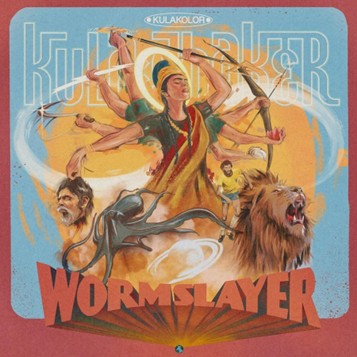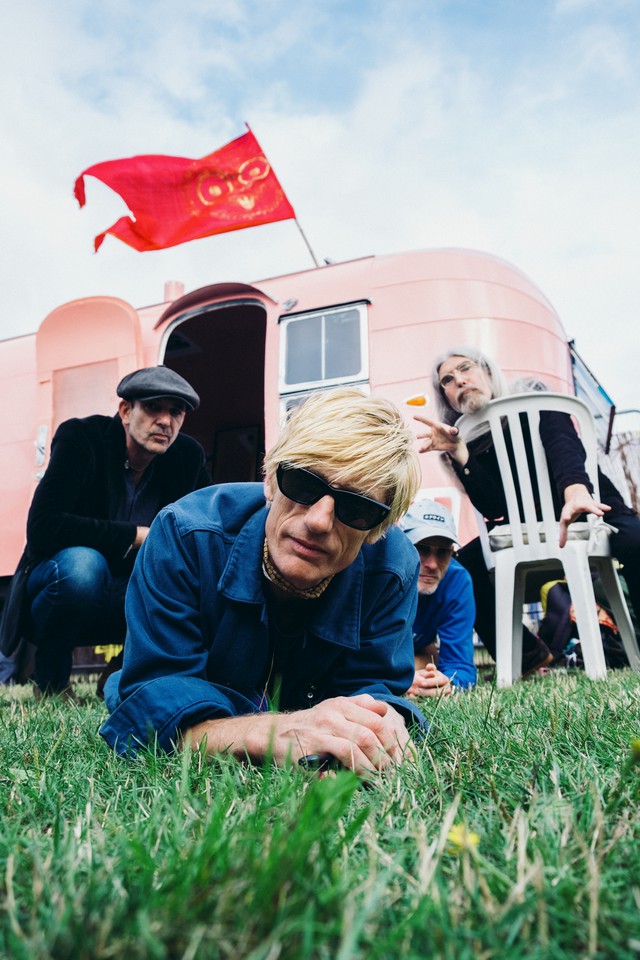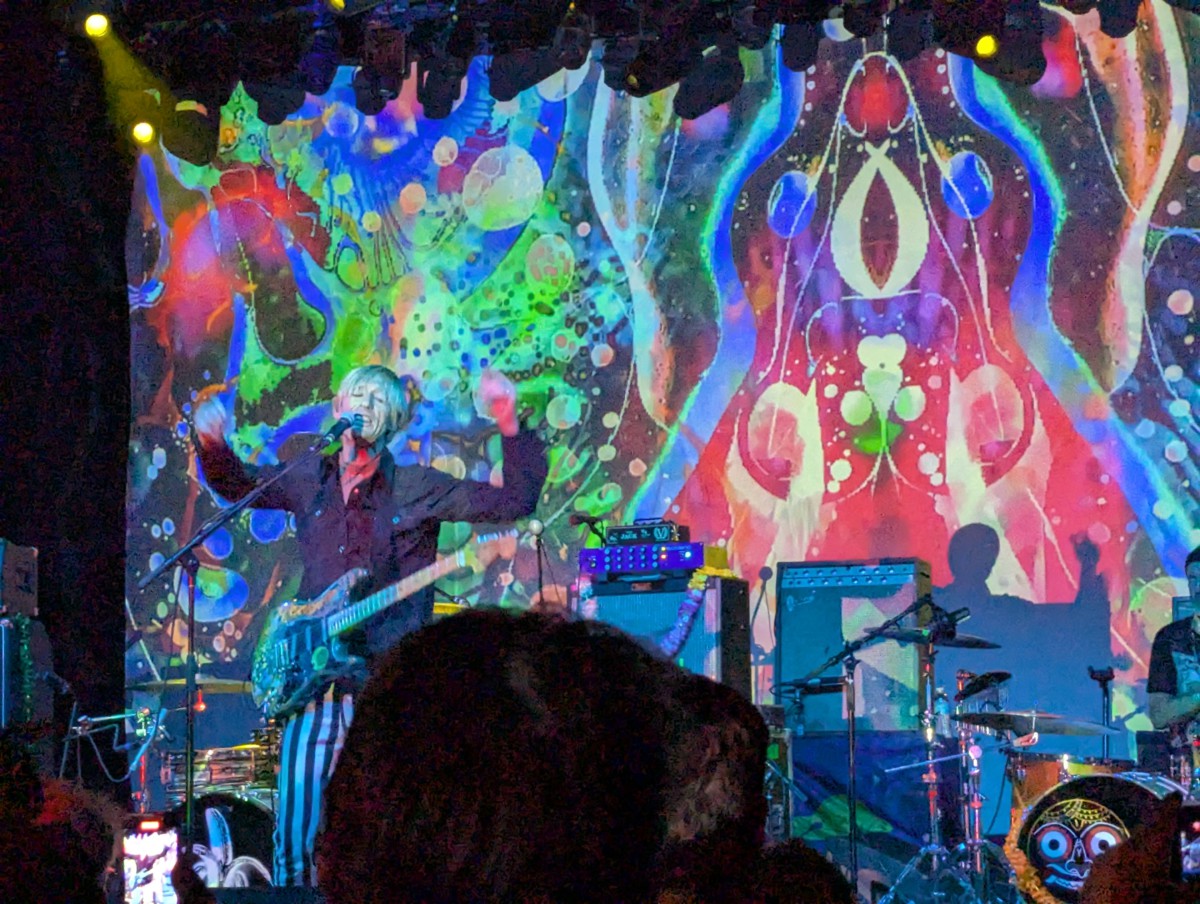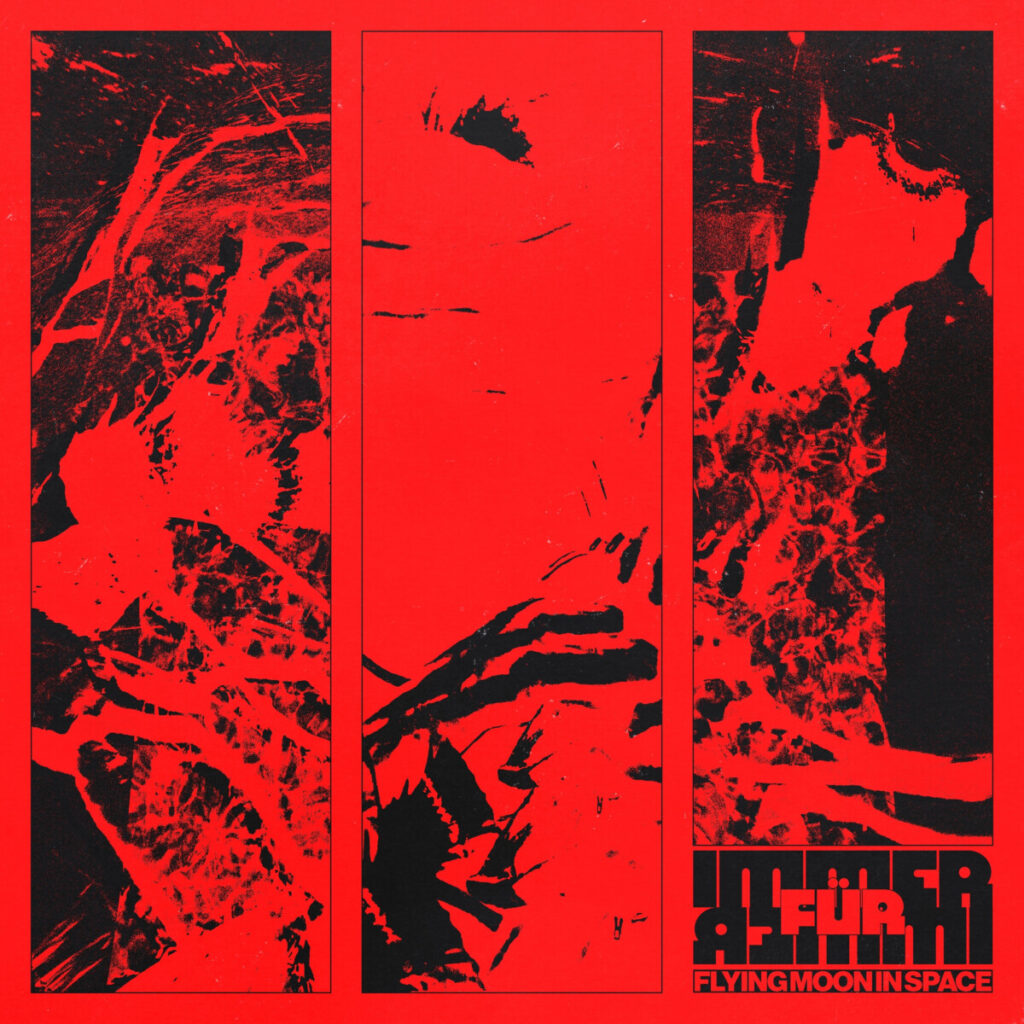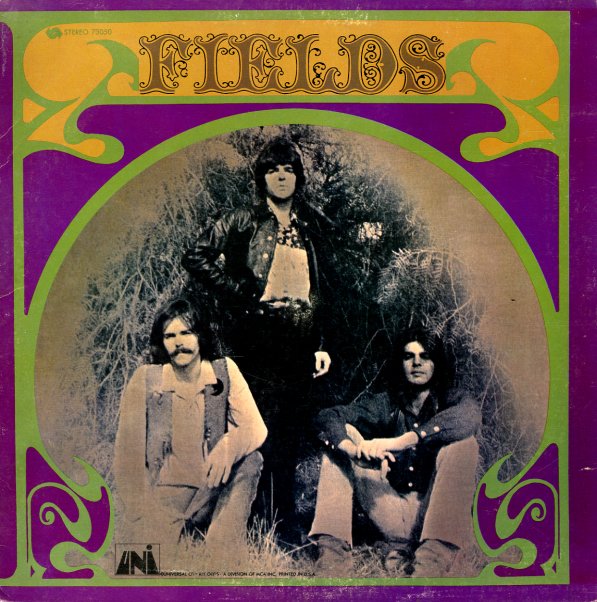Interview: Crispian Mills of Kula Shaker
Interview: Crispian Mills of Kula Shaker
Crispian Mills is the lead singer, guitarist, and principal songwriter for the British rock band Kula Shaker, known for fusing psychedelic rock with Indian mysticism and 1960s-inspired sounds. Since the band’s 1996 debut K, Mills has guided Kula Shaker through a series of acclaimed albums blending spiritual themes, sharp social commentary, and kaleidoscopic melodies. The son of actress Hayley Mills and director Roy Boulting, he has also worked as a filmmaker and continues to explore music’s transcendental side with the band’s forthcoming album, Wormslayer.
Jason LeValley: This is Jason LeValley of Psychedelic Scene, and I’m here with Mills, frontman for the band Kula Shaker, who have a new album coming out in January called Wormslayer. Thank you for joining me today, Crispian.
Crispian Mills: Hello, thank you for having me.
LeValley: So, the band’s latest album, Natural Magik, and the previous one, First Congregational Church of Eternal Love and Free Hugs, have led to Kula Shaker having a creative resurgence. What do you think fuels Kula Shaker’s current wave of late career inspiration and vitality?
Mills: Cough syrup, caffeine, nose drops. I think any band, you need to still enjoy playing music, but you also need to feel that it’s your time. We still enjoy playing music and we’ve had a long career with lots of breaks. We’ve been quite reckless, actually, having like four, five years off between records and going off and doing other things like families—having families, that was reckless of us. When we hooked up with Jay, the original lineup with Jay playing Hammond organ, it felt like it was a good time for the band. The Kula Shaker 21st-century post-COVID world was just perfect terrain for a band like us. Especially, the emphasis on live shows and storytelling. So we’re here and it feels good, and people seem to appreciate us being back, so we’ll stick at it.
LeValley: Yeah. Well, I really enjoyed the show in Tempe, as I mentioned before. I love your fascination with Indian mysticism and the culture. How does your personal journey shape the band’s musical direction today?
Mills: I’m just sitting in the van with everybody else, watching the road unfold. In some respects, you could say I brought the Indian thing in, but it was brought to me by people that I knew, some friends and a girl I met, and various people and encounters I’ve had. You pass it on and influence others. My drummer Paul, he’s in India now. I’m not in India, I’m in Cornwall. He’s there with his wife and they’re studying miniature painting. Alonso was at the Kumbh Mela, the great spiritual festival, with millions of people. We’ve all had these unique experiences that we’ve absorbed, and the band is supercharged with a lot of incredible experiences and encounters, and that’s what you feed off. I guess we’ve got a lot in the tank.
LeValley: Okay. You mentioned peak experiences. Have psychedelic substances played a role in influencing your music at all?
Mills: What would give you that idea? No, I picked this background because it reminded me of a nice cup of tea. It’s definitely a huge part of music, especially the type of music we play—you want at least a point of reference. We were going to work once with Terry Gilliam, just after he’d done Fear and Loathing and we were working on the Pink Floyd boat studio with Bob Ezrin and Terry came down. We were talking about doing something for Peasants, Pigs and Astronauts…
Mills: We were working on the Pink Floyd boat with Bob Ezrin and Terry Gilliam came down. We were talking with him about filming together for Peasants, Pigs and Astronauts, which was a big opus, a kind of concept album. He said he’d never taken LSD. I think he’d had a smoke or something, but he’d never gone full psychedelic and he wondered whether it would actually have an inverse reaction and the effect would perhaps straighten him out. Some people don’t need it.
LeValley: That’s true. His stuff is surreal enough on its own.
Mills: Yeah, it certainly affects how you listen to music and gives you a different viewpoint. I think psychedelics were being dabbled in before it became popular culture in the 60s. I was watching the Marx Brothers the other day with my kids—they were definitely on something.
LeValley: You make reference in one of your songs, “Broke as Folk,” about your mother. What was it like growing up with a famous actress for a mother?
Mills: Disney was definitely on drugs. My mom was a Disney kid and that was a remarkable and extremely weird childhood, but I grew up and that’s all I knew, so it was normal for me. It was only as I became an adult, especially when I had kids, that I was able to appreciate how completely unnatural it must have been for her. I helped her with her memoir, which was called Forever Young, and it dealt with that time being with Disney through all of her teens. It was much more of a family studio in those days, and Walt was still the boss. It was actually helpful for her, in her 60s and 70s, to look back on it objectively. It’s taken that long to see what a crazy, extreme experience it was.
LeValley: Yeah. What role does family play in your life and creativity, especially as you continue touring and making music?
Mills: I always love the story of Francis Ford Coppola saying don’t be afraid to have a family because it grounds you, motivates you, and gives you a connection to the world so you’re not just living in your filmmaker bubble. It’s been a huge inspiration for me to have a family. It’s given me a whole other reason to make music and a whole other perspective on life. It is hard though, without a doubt.
LeValley: How old are your kids now?
Mills: My kids are now 14 and 17.
LeValley: Are they interested in pursuing a career in music or acting?
Mills: Yes, they’re both insane! They love music, but the problem with music now is it’s not really a business anymore—it’s been destroyed by the algorithms, by Spotify, and by AI.
LeValley: Yeah.
Ami Jay
Mills: AI is a lot of hype, but AI music is terrible. You still need artists to make it sound good. I don’t think it’s going to replace anybody. There are lots of people with no taste who might be impressed by it, but I don’t worry about it.
LeValley: Kula Shaker is often grouped in with Britpop. What sets your band apart, and what are your thoughts on the Britpop movement now?
Mills: We were always cynical about Britpop and didn’t even know what it meant. Obviously now in hindsight, it was just a media label and there were a lot of guitar bands coming out of Britain. Britpop really wasn’t about anything. It wasn’t saying anything, other than let’s have a beer. There were some good songs being written, and it was fun and entertaining, but at the time I always took it with a sack of salt because it just didn’t seem to be expressing anything very imaginative. As we approached the millennium, nobody was singing about what does it mean or where we are headed, so we decided to do a concept album about the new millennium with Peasants, Pigs and Astronauts. It wasn’t a huge success, but it actually set us forward in becoming a sort of cult band.
LeValley: Your lyrics often criticize systems of power or offer spiritual alternatives. Do you feel that music still has the capacity to create meaningful change in society today?
Mills: Music on its own doesn’t, but people do. I worked with a writer, Bruce Robinson, who wrote Withnail and I, a very famous British cult film. He didn’t believe films made any difference, which was a reaction to Hollywood writers talking about their responsibility for political or moral messages. You could say the same about music. Truth is, films, songs, books—they’re catalysts for people. It’s like critical mass; things come together and help shape the identity of a movement and a worldview. Every now and then you have a Bob Dylan—those moments are rare. Even Bob Dylan wanted to get off and not be labeled.
LeValley: Right.
Mills: As soon as you get lots of people involved, it starts to become like a religion. Everybody’s opinions have to conform and it’s a real drag—the point of individual expression is that everybody’s got to be different.
LeValley: If you could work with any artist today, who would it be?
Mills: Oh, Shawn Mendes.
LeValley: Shawn Mendes?
Mills: Just kidding. I just walked past the television and he was on some Netflix show, hamming it up for the camera in the stadium. I hope he’s ashamed of himself.
Jason LeValley
LeValley: Well, okay, so that’s what you’re going to go with?
Mills: Yeah, it’ll have to be Shawn Mendes, just so I can punch him in the chest. But seriously, we’ve talked about doing gigs with King Gizzard and the Lizard Wizard. They’re exciting live, and we thought about playing with them.
LeValley: That’d be a great bill!
Mills: We haven’t really talked about going in the studio with anyone, but playing live and being on the same bill would be great. One person we wanted to collaborate with was the lighting guy Lance Gordon, the mad liquid alchemist. I followed him on Instagram, messaged him, brought him over to Britain, and he blew a lot of tiny minds. We played shows with him in America, too, and want to do more of that.
LeValley: You have a new album coming out in January called Wormslayer. What do you want to say about it?
Mills: What do I want to say? Buy it now, it’s genius! The band has had a new lease of life and Wormslayer is the next step since Natural Magik, where we went back to our pop roots. It was a lot of fun. Wormslayer keeps that but opens up storytelling even more—the title track is nine minutes long in three parts. It’s a really good balance, and we’re excited for people to hear it.
LeValley: Will there be another tour?
Mills: We don’t stop. As far as coming back to America, I hope so. Hopefully next autumn, by then we’ll be back again.
LeValley: Great. Crispian, thanks so much for taking the time. I really appreciate it. It was a pleasure talking to you.
Mills: Oh, well, thank you. All right, man. We’re done, are we?
LeValley: Unless there’s anything else you’d like to say.
Mills: Ding dong do. Well, I’m glad I didn’t break up anymore. At least my picture didn’t break up, maybe mentally. Nice to meet you. I hope I’ll meet you next time.
LeValley: I hope so too.
Mills: Take care. Bye bye.
|
|
|
|
Gallery
Recent Articles
Vinyl Relics: Fields by Fields
•
February 10, 2026
A Tale of Crescendo ~ Epilogue
•
February 7, 2026

Loading...
Vinyl Relics: Would You Believe with Billy Nicholls
- Farmer John
